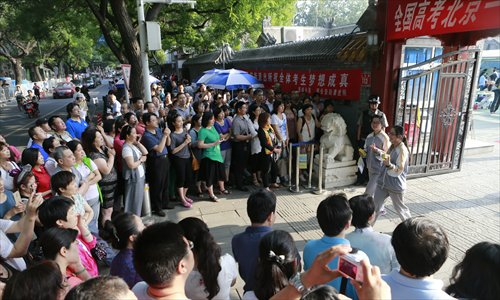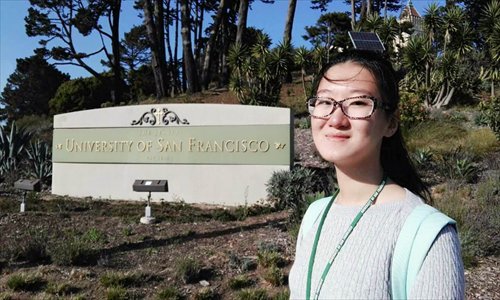A growing number of foreign universities are starting to accept gaokao scores for admission

Some Chinese students use their gaokao scores to take an alternative route to studying abroad. Photo: IC
Chen Yin, an 18-year-old girl from Beijing, was a bit disappointed last year when the national college entrance examination or gaokao scores were announced. Despite scoring 40 points higher than the enrollment threshold for top universities, Chen still didn't get into her first choice: a top university in Beijing.
She was mentally preparing to attend her second choice, a university in Chongqing, when she heard that the University of San Francisco (USF) had a gaokao-based early admission program for Chinese students, like her, who scored above the enrollment threshold. Chen immediately applied, and one week after the interview, she got an offer. The rest was history.
Now, after almost a year majoring in biology at USF, Chen has adapted well to her new life and is very happy with her choice.
"I did not have to go to a not very good domestic university," said Chen. "It also saved me quite a lot of time preparing for SAT (Scholastic Aptitude Test, a test used for admission into American universities) and TOEFL (Test of English as a Foreign Language)."
The gaokao scores in Beijing, and many other provinces, were announced recently. While some students are busy prepping to apply for the university of their choice, others are left with their second best.
In China's highly competitive market, sometimes even above average scores fail to get the desired results. Now, instead of being shunted to universities they don't want to attend, students have the option of attending universities abroad, thanks to the jump in the number of universities willing to accept gaokao scores. Currently, several universities in the US, Italy, Germany, and around 30 universities in Australia recognize gaokao scores, and the number is still growing.

Students exit one of the test sites after finishing the gaokao in Beijing on June 8. More and more foreign universities are accepting gaokao scores for Chinese student enrollment. Photo: Li Hao/GT

Chen Yin, one of the students who matriculated into the University of San Francisco through its gaokao-based early admission program in 2015. Photo: Courtesy of Chen Yin
Why recognize gaokao grades?
Among the foreign countries, Australia is the first to recognize gaokao scores, according to the People's Daily in 2015.
A consultant surnamed Zhu at the Australia International Student Management Center China Office told Metropolitan that since the University of Sydney recognized gaokao in 2012, they have seen a growing number of Australian universities follow suit. So far, around 30 universities in Australia accept gaokao.
"These universities told us that they find that many of the gaokao students perform well, which encourages them to continue enrolling based on this criteria this year," said Zhu.
She said she has been receiving many inquires about the requirements and application process recently.
This year is USF's second year of accepting gaokao scores for university admission. The school is the second university in the US, after the Illinois Institute of Technology, to introduce a gaokao-based early admission program.
Stanley D. Nel, vice president of international relations at USF with responsibility for China admissions, said the school drew from Australia's evaluation process to create USF's gaokao admission program.
But he said that besides accepting gaokao scores, they also try interview process instead of requiring IELTS (International English Language Testing System) scores, which is required by Australian universities.
"It is simply not possible to do well in an open-ended, one-on-one, face-to-face interview with an English professor unless one actually has good English proficiency. Students' gaokao scores and in-person interview performance help examiners evaluate their abilities," said Nel.
He said that last year, when the program was pilot, they interviewed 74 students out of more than 200 applicants and enrolled 20. Only those whose scores are above the cut-off line for first-tier universities have a chance at getting an interview.
"Gaokao has the advantage of being what educational experts call a 'criterion-referenced' exam; it tests not only intellectual ability but also whether students are able to work hard and consistently to master a large body of knowledge over an extended period," said Nel. "In this way, it is similar to the International Baccalaureate Diploma (a program that was formulated in Switzerland and is recognized worldwide for its rigor and innovation), although there are differences."
He said multiple studies have shown that SAT scores have not much predictive value in helping evaluators decide who will do well at the university level. The SAT tests only mathematics, reading, and writing, and some reasoning ability. It does not test specific knowledge of subject matter, such as history or physics or whatever else the student has studied, Nel said.
"The students exceeded our expectations. They adapted quickly and well to life at USF," said Nel of the first batch of enrollees.
He said they have a combined grade point average (GPA) of 3.5 out of a possible 4.0, and eight of them had GPAs above 3.8. American freshmen at USF had an average of 3.2, and other international freshmen, including Chinese students who did not come through the gaokao program, had an average of below 3.0.
Credibility concerns
On June 11, the ACT (American College Testing, a college entrance test) exam was canceled hours before it was to be administered in Hong Kong and South Korea because of leaked test papers, the Washington Post reported in June. The decision affected over 5,000 Chinese who went to Hong Kong to take the exam, some of whom might miss their early application for American universities.
It is just one of a wave of cheating and leaking scandals in China. In October 2014, the SAT scores of over 20,000 Chinese students were withheld for three weeks until November 22 due to allegations that some of the students were engaged in cheating, according to a New York Times report in 2014. Some of the students complained about being punished for something they did not do.
Wang Jiawei, a 19-year-old boy from Beijing, who enrolled at USF in 2015, thinks some Chinese students and parents are too utilitarian about the tests, resorting to cheating and faking records in some cases.
Wang said that due to the scandals, foreign universities, especially top ones have tightened the check for Chinese students' credentials and increase the threshold for Chinese applicants.
Nel said that educational consultants falsifying high school transcripts for students has made high school GPA an unreliable evaluation tool. He said USF has found that between 10 to 12 percent of all the transcripts they receive are fake.
China's burgeoning test preparation industry has made some tests unreliable. "Over the past few years, we also have found that the scores on the TOEFL are becoming less reliable," he said, adding that people are increasingly exploiting the "weaknesses in the testing procedure."
Nel further explained that only a relative small number of different versions of the TOEFL, for example, are used at any given time. Also, a large training organization has the resources to send people to take every test given. Thus they are able to reconstruct the tests and train students to do well simply by memorizing answers.
"The tests do change from year to year, but not fast enough. It is indeed the case that people have exploited time differences between, for example, Australia and China, to cheat," said Nel. "The gaokao, of course, suffers from none of these problems. The Chinese government goes to great lengths to ensure that there is almost no cheating on the gaokao, and the scores can be verified directly with provincial officials."
Gaokao reform
Although the gaokao has been accepted by more foreign universities, it is still not accepted by a majority of universities due to its own weaknesses.
The main problem is that many foreign universities cannot accept that it is a one-shot exam. Also, some believe that gaokao focuses more on memory rather than ability, according to a Xinhua News Agency report in 2015.
Nel also said that the English language component of the gaokao is not really designed to measure language proficiency to meet their standards, which is why they need the interview.
But Wang is optimistic that more foreign universities will accept gaokao scores in the future and largely attributes the increasing adoption to the recent gaokao reform.
In 2014, the Ministry of Education issued a guideline for the reform of the gaokao. It was aimed at selecting real talent by giving students and universities more choices and was in line with global exam reforms, the People's Daily reported in 2015.
Wang thinks that Beijing's Chinese language exam reform was successful.
"For the reading part, it stressed more on one's logic and thinking as a person instead of as a test machine, which gave me a misconception that I was taking an American standardized test," said Wang.
He also thinks using gaokao scores is more appropriate for people like him who did not get into the university of their choice. It is also an option for those who are uncertain about where they want to study. But according to him, the majority of the students who want to study abroad usually take the traditional route: preparing for exams like the SAT during their first or second year and getting offers between February and June of their third year, just before gaokao.
"This way, they can better prepare for going abroad and are more likely to get a top offer with a wider range of choices, especially for American and European universities," said Wang, noting that so far, British universities are yet to recognize gaokao scores.
Nel said he would like to see USF admitting the majority of its Chinese students via their gaokao scores in the future.
"We have already received inquiries from other American universities asking for assistance in creating a similar admission process," he said. "I believe the number of universities worldwide who follow our example will grow over the coming years."
Newspaper headline: Goodbye SATs!